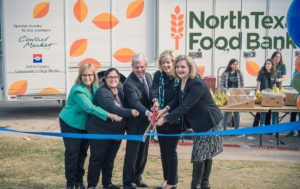
Anyone who’s tried to concentrate on an empty stomach knows what it’s like to be “hangry” — that irritable feeling of hunger which increases the longer you go between meals. But the experience of food insecurity, or lacking consistent access to safe and nutritionous foods, goes beyond occasional hunger, and it’s an all-too-common reality on college campuses across the country.
The Dallas County Community College District (DCCCD) showcased its latest effort to help students and community members who face food insecurity in late March when it unveiled a new mobile food truck in partnership with the North Texas Food Bank and H-E-B/Central Market. The food truck sports logos for all three partners and made its debut during an unveiling ceremony at Brookhaven College.
Volunteers who were staffing the new, branded food truck bagged up 5,000 pounds of food for 252 people over a period of two hours. Out of the fresh fruit, vegetables and other items available, only a few heads of lettuce remained.
“Today, we celebrate a partnership that we’ve been building for the past 18 months,” said DCCCD’s chancellor, Dr. Joe May. “It’s a critical partnership meant to help our students who don’t have the resources they need to feed themselves or to eat balanced meals.”
DCCCD reached out to the North Texas Food Bank after participating in a nationwide survey in 2016 that showed substantial numbers of its students were struggling to eat.
The study, which was administered by the University of Wisconsin’s HOPE Lab, showed that 64 percent of DCCCD students reported “marginal or worse food security” during the previous month. Twenty-seven percent reported very low food security, which reflects “multiple indications of reduced food intake and disrupted eating patterns due to inadequate resources for food.”
“When we saw the results, we knew that we needed to do something,” said Pyeper Wilkins, chief advancement officer and executive director of the DCCCD Foundation. “Students had no access to healthy food, were skipping meals or were missing meals because they couldn’t afford it. Potentially, some of them could drop out because they needed to get a job to feed their family.”
Food trucks latest effort to serve the students
Wilkins was instrumental in launching DCCCD’s partnership with the North Texas Food Bank, which also has helped the district’s colleges set up their own on-site food pantries. The new food truck will take over for NTFB’s mobile food pantry, which had been filling the gaps in what each school could provide. DCCCD’s colleges also are setting up on-site assistance to help students apply for SNAP and other social service benefits.
Anyone can take advantage of food bank or food pantry resources at DCCCD’s seven colleges. When clients visit the mobile food truck, they are asked to provide their name and date of birth, and the number of people in their household. Food truck workers do not share this information with anyone, and they do not verify proof of need, income or immigration status. They only use data to track how many people receive help.
The North Texas Food Bank also uses the information to estimate how much food should be delivered to each college.
During fiscal year 2018, the North Texas Food Bank and DCCCD distributed a total of 186,656 meals — or more than 167,000 pounds of food. Fundraisers, including a 5K run honoring first responders, a crowdfunding campaign and an employee giving campaign, have helped support the effort. Nearly $80,000 has been raised to date.
“All of our colleges have really come through for their students,” said Wilkins. “Many of them are taking food donations and doing food drives constantly.”
Brookhaven’s food pantry, called “The Cave,” is among the most well-established of DCCCD’s food pantries. It started as a service learning project and then found a permanent home with regular hours in the K Building with the help of volunteers and work-study students.
Jennifer Allen, a history instructor who coordinates the pantry, helped distribute items from the food truck during the unveiling, along with regular volunteers. Allen faced food insecurity when she first started her teaching career, and her role in the classroom motivates her to be involved.
“I have not forgotten what it feels like to look at a bank account that does not cover basic needs,” Allen said. “I had to pocket extra food at faculty meetings, skip meals and ‘permanently borrow’ paper products from work.”
She added, “I also want my students to succeed. Many people in our community are doing all they can to work, attend classes and be successful. If they cannot eat, they will sacrifice knowledge for food.”




